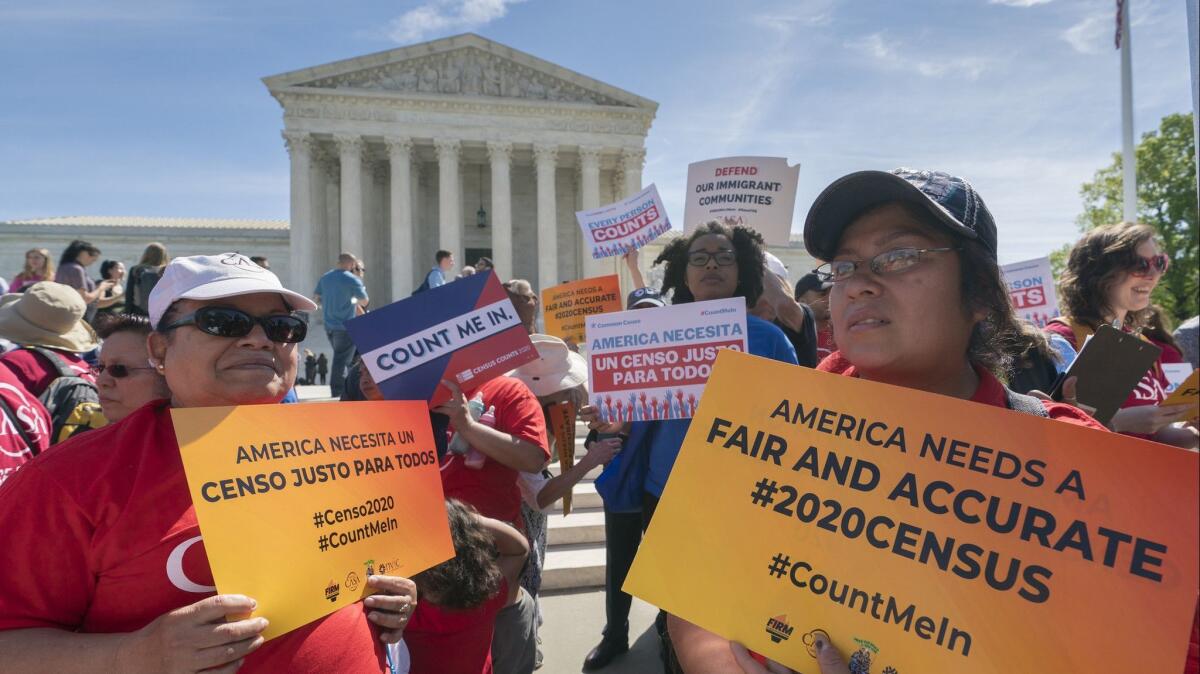Op-Ed: It’s obvious the census question is partisan, but the Supreme Court still won’t care

- Share via
It is rare that plaintiffs challenging a government policy can locate smoking-gun evidence regarding the illicit motives of government decision makers. Yet for the second year in a row at the Supreme Court, a group of plaintiffs — this time challenging the addition of the citizenship question to the 2020 census — has produced evidence that the Trump administration deliberately adopted a policy to put minorities at a disadvantage.
If the past is any indicator, the court is going to discount that evidence and explain why it doesn’t matter. But the rest of us shouldn’t forget that the administration has discriminated against minorities or that the court lets them get away with it.
As a general rule, plaintiffs challenging a government policy have to show the policy places disproportionate burdens on a particular group and that the government intended to place the group at a disadvantage. This means government decision makers know they should avoid spelling out their intent to discriminate against a particular group.
President Trump’s administration never got that message. As a candidate, Trump announced a plan to prevent Muslims from coming to the United States. A week after taking office, he signed an executive order banning people from several Muslim-majority countries from entering the U.S. while allowing entry for religious minorities (such as Christians) from those countries.
If the past is any indicator, the court is going to discount that evidence and explain why it doesn’t matter.
The president’s order underwent a few iterations — the final version added a few countries and modified some justifications. When the order finally made its way to the high court last year, the plaintiffs argued that the president’s stated promise to discriminate against Muslims attempting to enter the United States, along with the initial order and many other statements, demonstrated he intended to discriminate against Muslims.
The court showed it didn’t care. The court upheld the order and cited a confusing ground — that there was a reasonable way to understand the order as having a legitimate justification, even if the order did not actually have one. And the court said it was reasonable to understand the order as legitimate, since the president justified it on the basis of national security.
This year, the court is once again faced with ruling on a policy that will put minorities at a disadvantage — the addition of the citizenship question to the 2020 census. And once again, the plaintiffs challenging the policy have evidence showing the administration declared its intent to discriminate against minorities.
On Thursday, the plaintiffs challenging the census filed a letter explaining they had discovered by happenstance that a longtime Republican redistricting specialist had played a significant role in orchestrating the addition of the citizenship question. The specialist had previously advocated adding the question on the ground it would give an advantage to “Republicans and Non-Hispanic Whites.” He drafted a letter from the Department of Justice requesting the addition of the question, and the letter the department ultimately sent bore “striking similarities” to the specialist’s language and argument.
The administration has argued that the citizenship question would help it to enforce the Voting Rights Act. There is little question the administration is lying about its reasons for adding the question. The Trump administration has shown no interest in enforcing the act, and citizenship information wouldn’t help it do so. The citizenship question would reduce response rates in immigrant communities, making the census less accurate and the Voting Rights Act harder to enforce.
However, as the entry ban case makes clear, the plaintiffs challenging the addition of the question won’t prevail just because the administration is lying. The issue is what it would take to persuade this court to acknowledge that the administration is lying. Based on the entry ban case, we know it will take more than just an earlier statement of a discriminatory purpose.
Enter the Fray: First takes on the news of the minute from L.A. Times Opinion »
Unlike in the entry ban case, the court will not be able to point to the president’s powers over immigration and national security concerns as reasons to ignore strong evidence of discriminatory motive. But the oral argument in the census case suggested that the conservative justices are still hell-bent on coming up with legitimate reasons to explain the addition of the question.
The conservative justices, who recently invalidated a key provision of the Voting Rights Act and have narrowly interpreted other provisions, emphasized the importance of enforcing that statute. Although they are typically suspicious of international law, they pointed to the fact that census takers in foreign countries ask about citizenship as a reason to think the citizenship question is fine here.
The question is why. In the entry ban case, our humanity was at stake — the ban tore apart families, and refugees in countries subject to the order were left to suffer and die. In the citizenship case, our democracy is at risk. Adding the question would depress voter turnout in urban areas, enabling further gerrymandering and Republican minority control for years to come. That’s a reality the court should not ignore.
Leah Litman is an assistant professor of law at UC Irvine.
More to Read
A cure for the common opinion
Get thought-provoking perspectives with our weekly newsletter.
You may occasionally receive promotional content from the Los Angeles Times.









